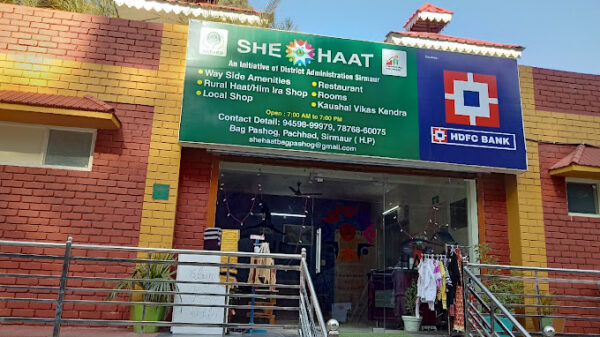Sirmour News
Empowering Tradition: The Success Story of 23 Women Behind a Himachal Restaurant Serving Sirmauri Delights
Four Years of Unity and Skill: How a Group of Women in Bag Pashog Transformed Their Lives Through Culinary Craft

Nestled in the picturesque Bag Pashog village of Sirmaur district, just an hour’s drive from the charming hill town of Kasauli, a remarkable group of 23 women has turned their culinary expertise into a thriving success story. In this serene part of Himachal Pradesh, these women have blended tradition with entrepreneurship, creating a unique dining experience that not only showcases their skills but also reflects their journey of empowerment and community spirit.
She Haat, the distinctive ethnic restaurant run by this dynamic group of women, has become a culinary gem in rural Himachal Pradesh. Offering an authentic taste of traditional Sirmauri cuisine, it stands out as a one-of-a-kind venture in the region. The restaurant’s charm is not only in its flavorful dishes but also in its stunning setting, with panoramic views of the majestic Churdhar peak, making it a must-visit destination for travelers seeking both a cultural and scenic retreat.
Launched with the backing of the district administration and the village panchayat, this initiative has proven to be a game-changer for the women of Bag Pashog. Beyond providing them with financial independence, it has significantly boosted their confidence, enabling them to break free from traditional limitations. The venture has empowered them to take charge of their futures, turning their culinary skills into a thriving business that has transformed not only their lives but also the dynamics of their community.
In addition to the ethnic restaurant, which features a cozy kitchen and welcoming seating area, the site also boasts a vibrant ‘rural haat.’ Here, the women, dressed in cheerful pink suits, offer a range of handmade handicrafts and organic produce harvested from their own farms. The project further enriches the experience with a two-room guest house, allowing visitors to enjoy a peaceful stay, while lush green spaces provide a serene environment for relaxation amidst nature’s beauty.
A Resilient, Self-Sustaining Model That Withstood the Pandemic’s Challenges
What sets She Haat apart is its self-sustaining financial model, which blends tradition with sustainability. The women prepare the restaurant’s authentic dishes using fresh vegetables, milk, homemade ghee, and spices either grown on their own farms or sourced from nearby local farms. At the end of each month, the profits are shared among the staff, after covering necessary expenses. To ensure transparency, the balance sheet is submitted for review to the local Pachhad sub-divisional magistrate (SDM), who serves as the ex-officio head of the She-Haat society, ensuring accountability and trust within the community.
